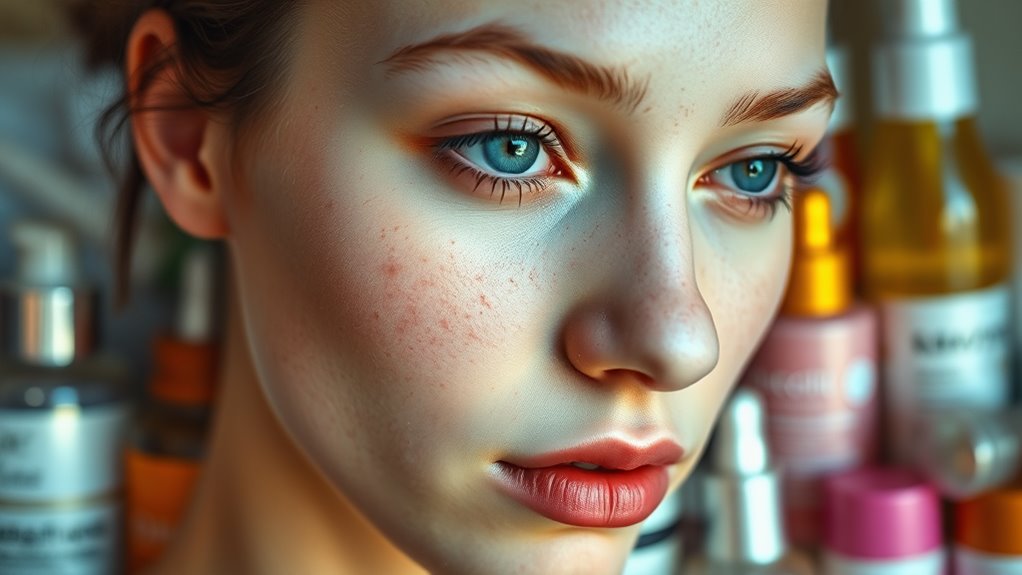Acne Myths You Still Believe (And Need to Stop)
You might believe common acne myths that can hinder effective treatment. Acne isn’t caused by poor hygiene alone; hormonal changes and skin bacteria play significant roles. Eating chocolate or greasy foods doesn’t directly cause breakouts either. Excessive sun exposure can actually worsen acne instead of healing it. Plus, acne doesn’t just affect teenagers—adults do too. Popping pimples is dangerous, leading to scarring and infections. Keep these facts in mind, and you’ll discover more about managing your skin effectively.
Myth 1: Acne Is Caused by Poor Hygiene
While many people believe that poor hygiene is the primary cause of acne, this myth oversimplifies a complex condition.
Acne results from a combination of factors, including hormonal fluctuations, excess oil production, and clogged pores.
Washing your face regularly can help, but it won’t eliminate underlying causes.
Research shows that the skin’s microbiome and inflammation also play essential roles.
By debunking acne myths like this one, you’ll better understand how to manage your skin.
Instead of focusing solely on hygiene, consider consulting a dermatologist for a thorough approach to acne treatment tailored to your specific needs. Additionally, understanding the role of the skin’s microbiome can empower you to make better skincare choices.
Myth 2: Eating Chocolate and Greasy Foods Causes Acne
Do you believe that indulging in chocolate or greasy foods leads to breakouts?
Research shows there’s no direct link between these foods and acne development.
While high-glycemic foods can cause insulin spikes, potentially exacerbating acne, chocolate itself doesn’t inherently trigger breakouts.
The real culprits are hormonal fluctuations and skin bacteria.
Greasy foods may lead to oily skin, but they don’t cause acne directly.
Instead, focus on a balanced diet rich in whole foods, antioxidants, and healthy fats. Foods that fuel acne can provide insight into better dietary choices for clearer skin.
Understanding that diet alone doesn’t dictate your skin health can empower you to make informed choices without fear of chocolate indulgence.
Myth 3: Sun Exposure Heals Acne
How often have you heard that sun exposure can clear up acne?
While it might seem like a quick fix, the reality is quite different.
Excessive sun exposure can actually worsen your skin’s condition. Consider these points:
- UV rays can lead to skin damage and inflammation, aggravating acne.
- Tanning may temporarily hide blemishes, but it doesn’t treat the underlying issues.
- Increased sun exposure can cause dryness, prompting your skin to produce more oil, potentially leading to more breakouts.
Additionally, using expired products can further compromise your skin’s health and effectiveness of treatments. Instead of relying on the sun, focus on scientifically-backed treatments for managing acne effectively.
Your skin will thank you for it!
Myth 4: Only Teenagers Get Acne
Is it surprising to learn that acne affects people of all ages, not just teenagers?
Many adults experience acne due to hormonal changes, stress, or underlying health issues.
In fact, studies show that about 40-55% of adults aged 20-40 deal with acne, with women often affected during hormonal fluctuations related to menstruation or pregnancy.
Adult acne can manifest differently than teenage acne, often presenting as cystic lesions or persistent spots.
Understanding this myth allows you to seek appropriate treatments and recognize that acne isn’t just a teenage problem.
Proper skincare and medical advice can help manage adult acne effectively. Additionally, addressing hidden acne triggers can significantly improve your skin’s condition.
Myth 5: Popping Pimples Is Harmless
Many people mistakenly believe that popping pimples is a harmless action that can lead to a quick fix for acne.
In reality, this practice can exacerbate your skin issues.
Here’s why you should think twice before reaching for that pimple:
- Infection Risk: Popping can introduce bacteria, leading to further breakouts or infections.
- Scarring: Squeezing pimples can damage skin tissue, resulting in permanent scars.
- Inflammation: It can cause increased redness and swelling, prolonging healing time.
Instead of popping, consider professional treatments or proper skincare to manage acne effectively and maintain your skin’s health. Additionally, it’s crucial to understand that the safe way to pop a pimple includes proper preparation and technique, which most people overlook.

